
Portugal’s higher education sector is on the ascendancy. We’re seeing improvements across QS metrics. What have institutions done to drive this change? What impact will this have on Portugal’s ability to attract students?
With the QS Higher Ed Summit: Europe 2025 being hosted in Porto, we thought it would be a good time to answer these questions.
Setting the scene
Twelve of Portugal’s universities are ranked in the QS World University Rankings 2025, with an average global rank of 480. According to OECD data from 2022, 33% of the country’s international students originate from Brazil, though, at a continent level, Africa is the most represented.
In total, 49,916 international students enrolled in Portugal in 2022; the proportion of international students among all tertiary enrolments rose from 4% in 2013 to 12% in 2022, further evidencing significant growth in Portugal’s international student recruitment numbers.
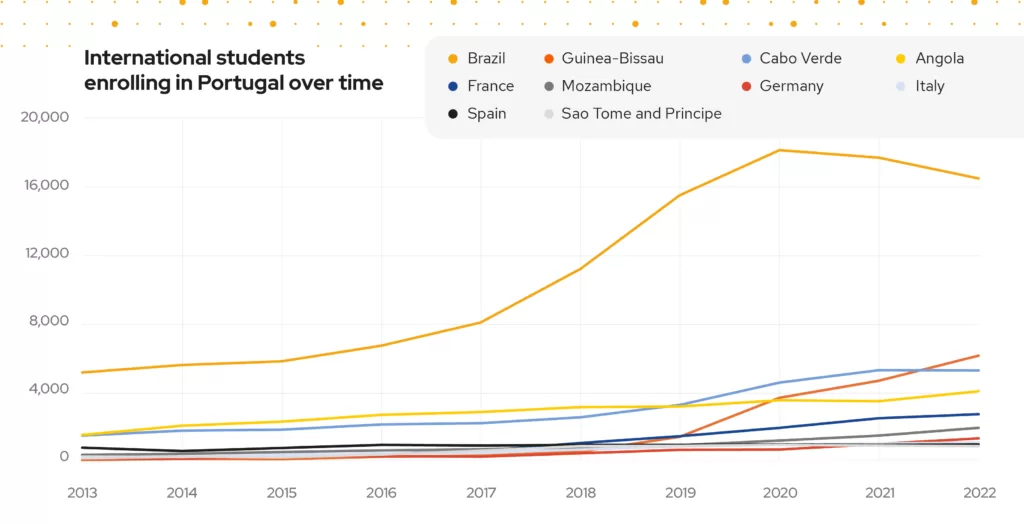
Portuguese performance in the QS World University Rankings
While an average rank of 480 is not especially high, it is higher than other continental European countries, and the average rank has improved over time.
Other European countries’ highest ranked institutions do perform better than Portugal’s, however.
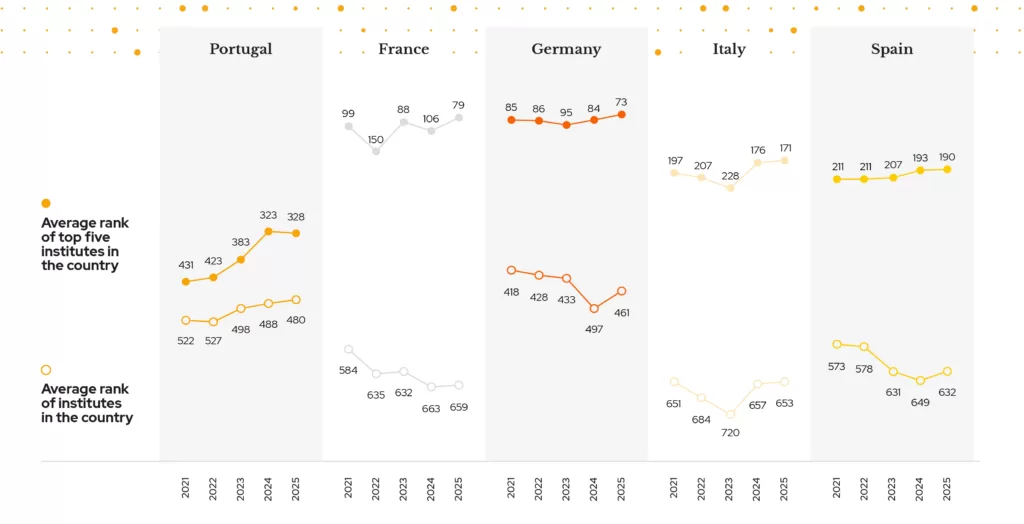
What is driving this improvement?
Significant investment in research programmes have enhanced the research impact (Citations per Faculty) of Portuguese universities, and their performance is now comparable to their European counterparts. As you can see below, Portuguese performance in International Research Network is also good – this metric also in turn supports their strong Citations per Faculty score.
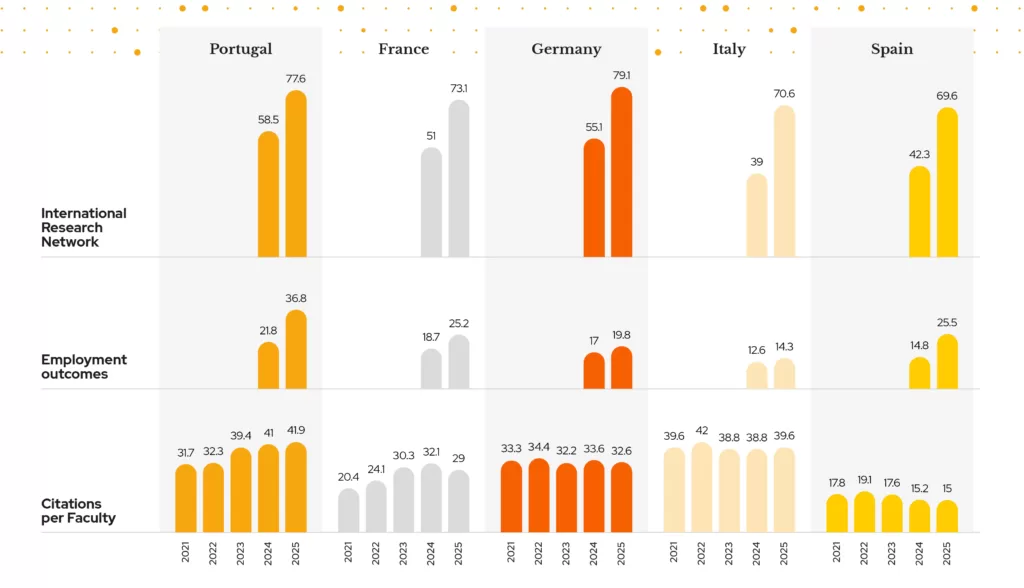
In Employment Outcomes, a crucial measure for career-driven international students, Portugal outperforms its European peers.
What are the preferences and motivations of students considering Portuguese study?
In the QS International Student Survey 2024, 74% of students interested in studying in Portugal said they have chosen a course to improve their employment prospects.
Work and employability are crucial to students’ assessments of a university’s teaching quality.
- 73% of students said a university organising work placements indicated teaching quality.
- 51% said a high graduate employment rate indicated teaching quality.
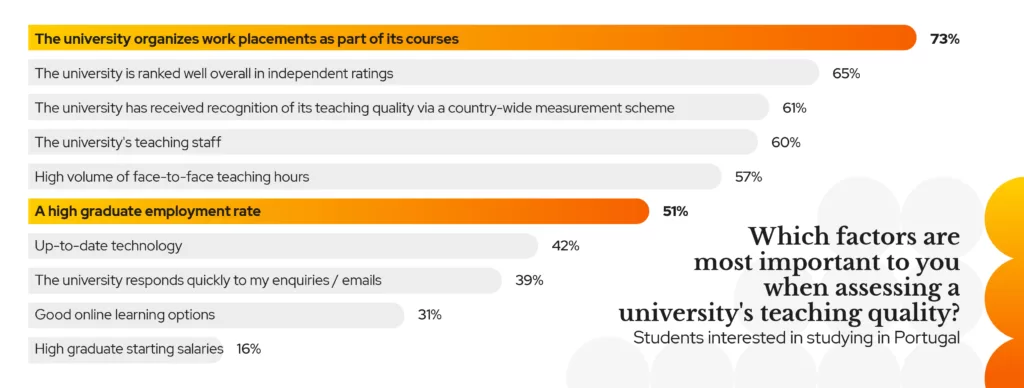
Digital information sources are key
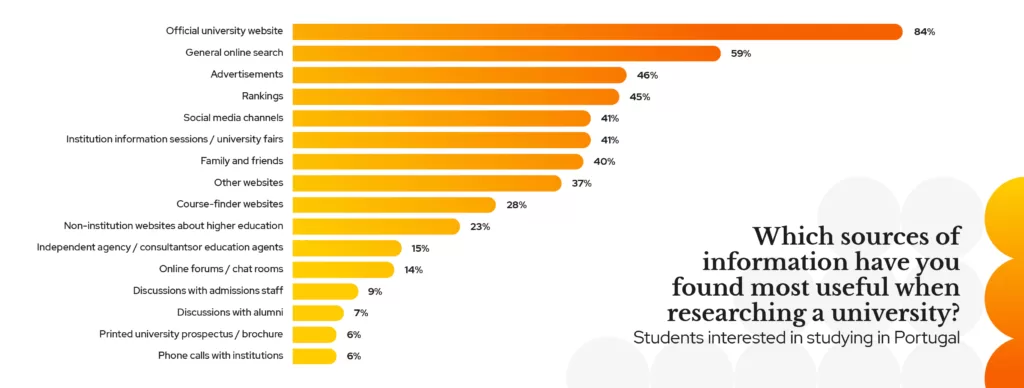
University websites and search engine results are key to those interested in studying in Portugal, with adverts and rankings also important information sources. Interestingly, there is little importance placed upon discussions with university representatives or alumni.
Prospective students clearly prioritise ranking and ratings when assessing teaching quality. Ranking well in independent ratings, and receiving recognition of teaching quality via a country-wide measurement scheme was indicative of teaching quality to 65% and 61% of students respectively.
49% of students interested in studying in Portugal judge whether a university is environmentally sustainable by its research output. With improvements across research metrics, Portuguese universities are well positioned to appeal to eco-conscious prospective students.
Sustainability important to prospective students
56% of students said environmental sustainability was either very or extremely important to them, with a massive 87% saying that working with the local community on sustainable and social justice initiatives is important when judging whether a university is sustainable.
Fortunately for Portuguese universities, data from the QS World University Rankings: Sustainability 2025 shows that the country’s best performance is in social sustainability.
With average scores of over 72/100, Impact of Education, Health and Wellbeing, Equality are three strong indicators.
In all these areas, Portuguese universities perform broadly consistently with their counterparts in other European destinations.
Environmental research is another area where Portuguese universities perform well, again reiterating the notion that their research impact is strong and is broadly comparable to that of other leading European destination markets. This, too, should serve Portuguese institutions well, with their prospective students placing importance on research output when judging environmental sustainability.
Improving visibility of Portugal is part of the strategy
At the QS Higher Ed Summit: Asia Pacific 2024, we announced that our European summit would be held in Porto. We sat down with Denise Castilho de Matos, Internationalisation Coordinator at the Erasmus+ National Agency in Portugal.
“Portugal’s ambition for higher education is multifaceted, aiming to improve accessibility, internationalisation and education quality.”
The Portuguese government is committed to increasing access to higher education, particularly for socially and economically disadvantaged groups, she adds. “This includes implementing policies and action plans to ensure more inclusive, accessible education.”
Regarding internationalisation, Portugal aims to boost its global presence by attracting international students and staff, fostering international collaborations and offering locally and globally relevant programmes. This strategy also includes developing strong and strategic partnerships and joint degrees.
“Portugal aims to boost its economic competitiveness and social cohesion. These ambitions reflect our commitment to creating a dynamic, inclusive and internationally recognised higher education system and contributes to both national and global progress.”
Join us in Porto
Reach the global higher education network at QS Higher Ed Summit: Europe 2025. In Porto, we will welcome hundreds of higher education experts from business schools and universities across the world. Create new partnerships, learn from experts, or share your own insights.



